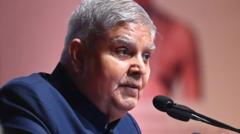Zia Yusuf's unexpected resignation as chairman of Reform U.K. marks a significant setback for the party, occurring amid controversial internal debates over immigration policies and personal viewpoints.
Reform U.K. Faces Turmoil as Chairman Resigns Following Internal Dispute

Reform U.K. Faces Turmoil as Chairman Resigns Following Internal Dispute
The resignation of Zia Yusuf, chairman of the anti-immigration party Reform U.K., highlights deepening divisions within the organization.
One of the leading members of Reform U.K., an emerging anti-immigration political party in Britain, has stepped down, signaling potential challenges for the faction as it navigates internal conflicts. Zia Yusuf's abrupt resignation from his role as chairman follows a contentious clash over differing views on the burqa, indicating deep rifts within the party ranks led by Nigel Farage.
Yusuf, a successful businessman and self-identified "British Muslim patriot," held considerable influence in shaping the organizational structure of Reform U.K. His departure represents a significant loss, particularly as the party seeks to solidify its identity and policies. Tensions escalated after Yusuf criticized a recent call by party member Sarah Pochin for Prime Minister Keir Starmer to impose a ban on the burqa, labeling her remarks as “dumb” and inconsistent with the party's established platform.
Interestingly, not all members supported Yusuf's stance; Reform’s chief whip, Lee Anderson, publicly endorsed Pochin's viewpoint by advocating for the prohibition of face-covering garments in public spaces. This disagreement points to a growing divide within the party regarding its messaging and the approaches it may adopt moving forward.
In his resignation announcement, Yusuf provided no specific reasons for his decision, stating merely that he no longer believed his efforts to secure a Reform government were productive. His exit could lead to further instability in an already tumultuous political climate for the party, as members grapple with conflicting perspectives and priorities.



















